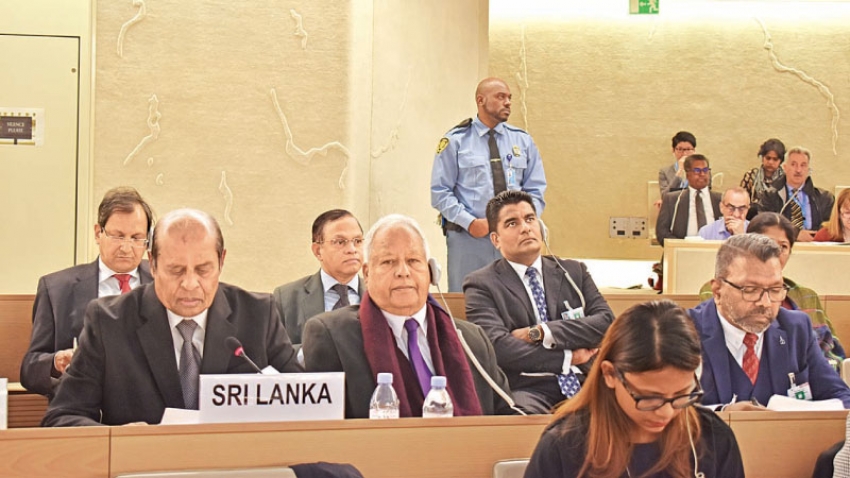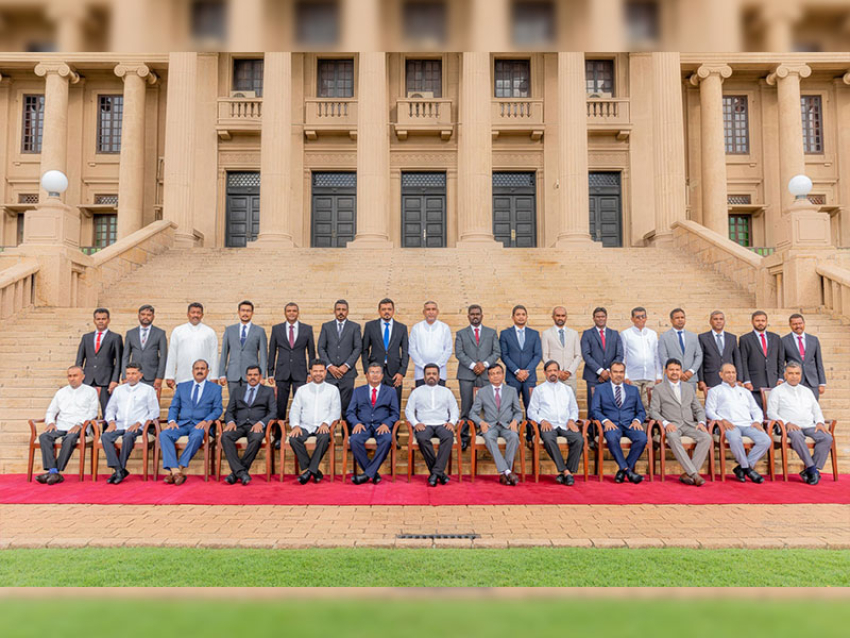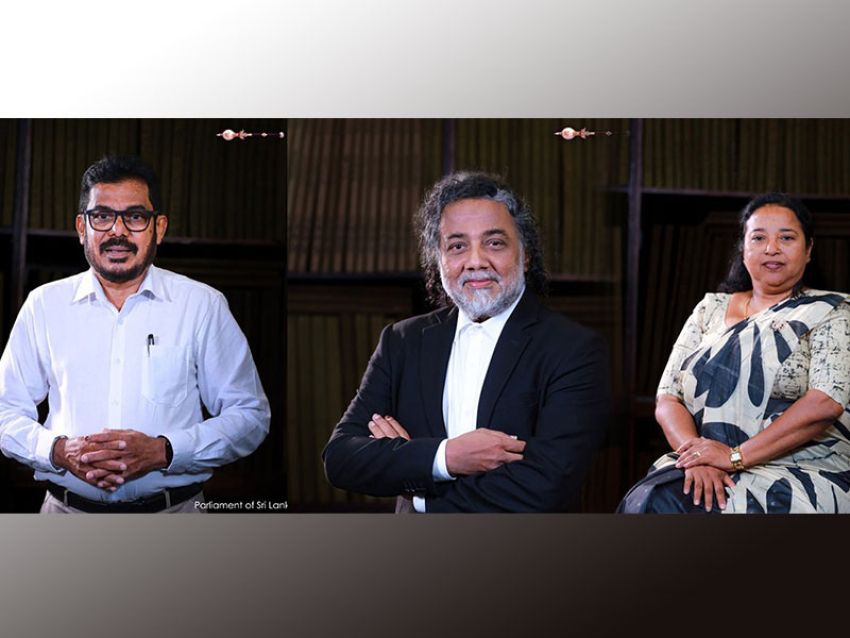Foreign Affairs Minister Tilak Marapana PC addressing the 40th Session of the United Nations Human Rights Council (UNHRC) in Geneva on Wednesday. Minister Dr. Sarath Amunugama, Northern Province Governor Dr. Suren Raghavan, Foreign Secretary Ravinatha Aryasinha, Deputy Solicitor General Nerin Pulle and Permanent Representative Ambassador A.L.A. Azeez are also in the delegation.
Foreign Affairs Minister Tilak Marapana PC addressing the 40th Session of the United Nations Human Rights Council (UNHRC) in Geneva on Wednesday. Minister Dr. Sarath Amunugama, Northern Province Governor Dr. Suren Raghavan, Foreign Secretary Ravinatha Ary
The government delegation comprises of Foreign Minister and members nominated by the President displayed that the consensual delegation could face the challenges at the United Nations Human Rights Council (UNHRC) in Geneva in a stronger footing in the face of UN human rights chief’s warning that Sri Lanka could slip back to conflict unless it addressed the ‘worst crimes’ during the final stages of its ethnic conflict.
High Commissioner Michelle Bachelet’s statement clearly showed the ignorance of the international body about the ground situation in Sri Lanka. While the people in the north and east demand more devolution of power and the imperative need to address their grievances, the Human Rights Council laments that Sri Lanka was yet to set up the special judicial mechanism as promised four years ago to try so-called ‘war criminals.’
Responding to the report of the HR High Commissioner, the leader of the Sri Lankan delegation, Foreign Affairs Minister Tilak Marapana pointed out that the action by the Sri Lankan Security Forces during the conflict was against a group designated as a terrorist organisation by many countries, and not against any community. The Minister said all communities in Sri Lanka were united against terrorism, and now that terrorism has been defeated, all communities are working in unison towards reconciliation and economic progress.
Sri Lankan delegation
Sri Lankan delegation that included former minister Dr. Sarath Amunugama and Northern Governor Suren Raghavan ruled out setting up of any hybrid courts by appointing foreign judges in addition to Sri Lanka judiciary. Delegation leader Marapana listed the steps taken by Sri Lanka to implement UNHRC proposal 30/1 and 34/1 and highlighted the substantial progress made thus far.
He criticized the prejudicial attitude of the Office of the High Commissioner for Human Rights (OHCHR) and said that the Government of Sri Lanka believed that it is indeed erroneous that more attention has not been paid to the some doubtful information, by agencies including the OHCHR, which is required to seek the truth.
Marapana referred to the prejudicial statements made in the OHCHR report on the discovery of human skeletal remains in a mass grave in Mannar, which have been scientifically dated back to 1499-1719 AD colonial era.
He said the case points to the need to exercise caution in approaching issues of this nature. This is yet another instance that demonstrates that allegations and mere collection of data should not be pre-judged to cast unjustified aspersions. It also amply demonstrates the need for allegations to always be subject to the due process of investigation in accordance with established legal procedures and not be hastily credited to support unfounded assumptions.
Political analysts are of the view that the decision taken to send a senior delegation representing the Government of Sri Lanka - President Maithripala Sirisena and Prime Minister Ranil Wickremesinghe - was a wise move because the country could put across its views in a stronger footing in light of the criticism leveled by High Commissioner Bachelet that, “lack of progress in setting up a special judicial mechanism to deal with the worst crimes committed during the 2009 conflict”. She also added that, “A contributing factor to delays appears to be a lack of common vision among the country’s highest leadership.” The High Commissioner’s statement raised many eyebrows in Geneva. She has no mandate to talk about internal political affairs of a member country.
Initially, the Ministry of Foreign Affairs did not want to send a delegation and advised Permanent Representative in Geneva, Ambassador Azees to handle it. But when the Ministry announced that already an agreement has been reached to co-sponsor a joint resolution, President Sirisena immediately responded that he would send a team comprising Dr. Sarath Amunugama, Mahinda Samarasinghe and Suren Raghavan.
Aftermath of that announcement, Marapana held discussions with the President on this issue as it was obvious that there could not be separate teams from the President and the Prime Minister. Marapana sought a compromise and it was then agreed that Foreign Minister would lead the team as protocol demands, and it would include Amunugama and Raghavan.
During the preliminary discussions in Geneva, Sri Lanka has already agreed to co-sponsor a resolution to seek an extension of timeline given to implement the Resolution 30/1 and 34/1.
The Ministry of Foreign affairs confirmed that the new resolution has been sponsored together with Britain, Germany, Canada, Montenegro and Macedonia.
Following that, Marapana told Parliament that Sri Lanka could not accept some of the points in the Report. The report calls on the Sri Lankan Government to accede to the Rome Statute of the International Criminal Court and establish a hybrid Court to handle allegations of war crimes and human rights abuses.
Minister added that the OHCHR Report stated that the Government has not returned the North and East lands used by the military. “That is not accurate. We have returned about 90 per cent of those lands to the original owners. There are several other things like that in this report. We would definitely raise our concerns about them during the session in Geneva”.
In Geneva too, Marapana referred to this in his statement. “With regard to the release of land in the North and East, 88.87% of State land and 92.16% of the private land originally held by the Security Forces, since May 2009 have been released and the figures highlight the utmost priority accorded by the Government to the incremental and expeditious release of lands held by the Security Forces. The remaining lands, which are a necessity in the context of national security, would continue to be held by the Security Forces, with compensation being paid in respect of privately-owned lands.”
Peace and reconciliation
Fortunately, Human Rights Chief Bachelet expressed appreciation and acknowledged Sri Lanka’s cooperation extended to the UN body. She has appreciated the ‘open, constructive and cooperative approach adopted by the Government of Sri Lanka, towards all stakeholders, both within and outside the country, and with the processes and mechanisms of this Council’.Foreign Minister Marapana said Sri Lanka’s intention has been to engage comprehensively so that “our deep-rooted commitment to achieving reconciliation is made evident”.
He added that the Sri Lankan Government looks forward to continuing its engagement with the OHCHR, UN Human Rights mechanisms and procedures, and working in close cooperation with the international community in its journey towards achieving civil, political as well as socio-economic and cultural rights, and consolidating durable peace and reconciliation for the people of Sri Lanka.




















